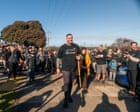Travis Lovett began his 486km journey with a single step and a long-held hope to bring the people ofVictoriawith him on a journey through the state’s colonial past.
It’s a traumatic past that Lovett has been peering into for the past three years through his work as a commissioner and co-chair on theYoorrook Justice Commission, the county’s first formal, Indigenous-led truth-telling process.
“Truth telling has never been more important than it is right now, with the commission coming to an end.” Lovett says. “That’s what I’ve emphasised on this walk.”
Sign up for Guardian Australia’s breaking news email
As he talks about his journey on Tuesday, the Kerrupmara Gunditjmara man is walking through Footscray on the second-last day of the Yoorrook commission’s walk for truth. The walk will arrive at state parliament on Wednesday.
The public inquiry has heard from thousands of Australians through hundreds of public submissions and hearings investigating the injustices and inequities experienced by Aboriginal Victorians.
Lovett began walking on 25 May in Gunditjmara country in the coastal town of Portland – the first contact for Victorian settlement in the 1820s – through Warrnambool, Colac, and Geelong and on towards Melbourne.
The route was informed by discussions with elders and traditional owner groups.
“What I’m most proud of about this walk is walking alongside our people … [guiding] where we went and which areas of historical and cultural significance that they’ve wanted to highlight and share with all of society,” he said.
He’s walked through driving rains and blustering winds; through fields, highways and city streets. For some stretches he has been joined by hundreds of other walkers, but much of the distance has been traversed alone.
“That’s when it was really hard going. Walking for eight hours in the wet and soaked. It’s hard,” he says.
The stories shared with the Yoorrook commission propelled him forward. “The walk has really culminated in elevating those lived experiences of our people, which is incredible,” he says.
“That’s when you dig deep. I’ve reflected on the truths that I’ve heard since being a commissioner on this commission as well about our people’s lived experience.”
Reconciliation Victoria co-chair, Andrew Gunstone, says the sections of the walk where members of the public were able to join have helped people come together and allowed healing to begin.
“There’s not a lot of knowledge about the impact of Portland on the history of Victoria but there were several hundred people [that] turned up that first day,” Gunstone says.
“There’s been a lot of excitement, a lot of community and it was really interesting to hear lots of people’s different ideas about why they’re walking for truth and why they’re walking for reconciliation.”
Sign up toBreaking News Australia
Get the most important news as it breaks
after newsletter promotion
For many, the failure of the voice to parliament referendum strengthened their desire to take part in a public truth-telling process. “There’s been a real desire to do something since the referendum, there was a lot of disappointment among those 6.2 million Australians who voted ‘yes’,” Gunstone says.
He says it is vital that truth-telling, justice and treaty are supported through all levels of government.
Among those who joined the walk were Peter Sharp, a historian and great-grandson of Australia’s second prime minister, Alfred Deakin. Deakin, as Victoria’s chief secretary, was responsible for the 1886 Aboriginal Protection Amendment Act (known offensively as the “Half-Caste” Act), which changed the definition of “Aboriginal” to exclude those who had one Indigenous parent.
The law enabled the forced removal of mixed-race children from reserves and was later implemented in other jurisdictions. It is acknowledged as the start of the Stolen Generations policy.
Sharp spoke before the commission in Septemberabout how he felt learning of the influence of his famous ancestor on one of darkest parts of Australian history.
“It was in the last place I would have ever expected to find it, in my own family history,” he says.
“The Walk for Truth from Portland to parliament has been, in a very personal way, for me, a retracing of my steps over the past 35 years from ignorance to understanding.”
Lovett says it is that commitment to coming together, uncovering the past, and moving toward truth and treaty that can allow the state to settle its painful past.
“We want to move forward, but it needs to be underpinned by truth and by justice,” he says. “Healing can happen, so we can all live in a more shared and prosperous future together.”
